Lecture 2 02.02.ppt
- Количество слайдов: 20
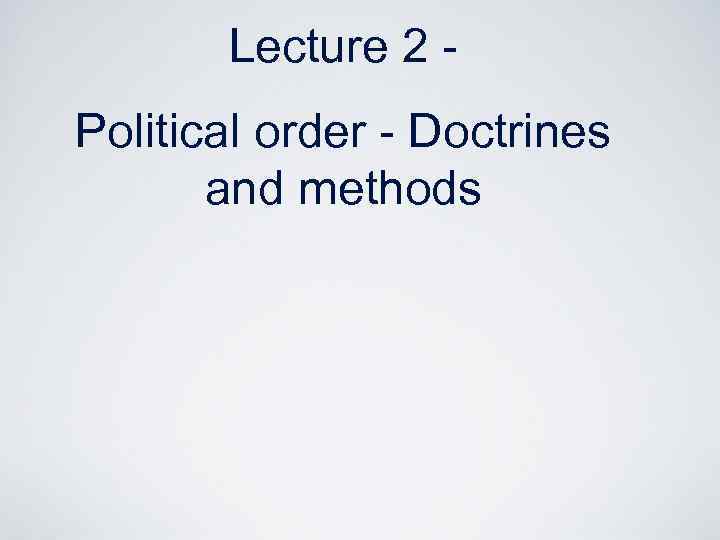 Lecture 2 - Political order - Doctrines and methods
Lecture 2 - Political order - Doctrines and methods
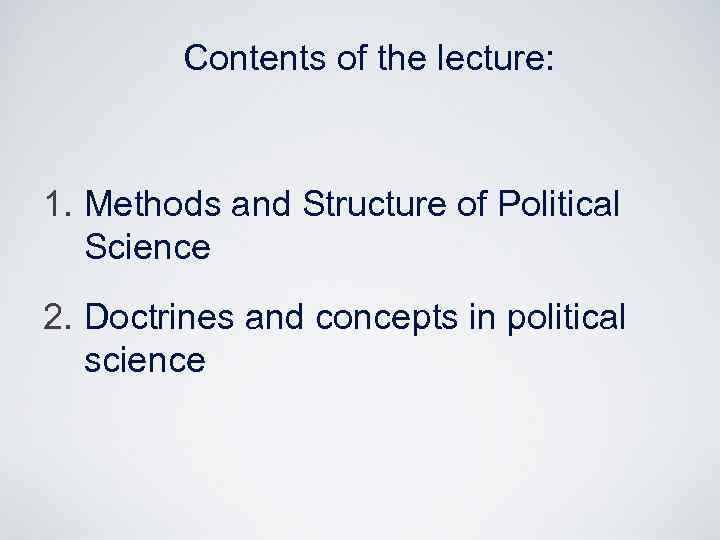 Contents of the lecture: 1. Methods and Structure of Political Science 2. Doctrines and concepts in political science
Contents of the lecture: 1. Methods and Structure of Political Science 2. Doctrines and concepts in political science
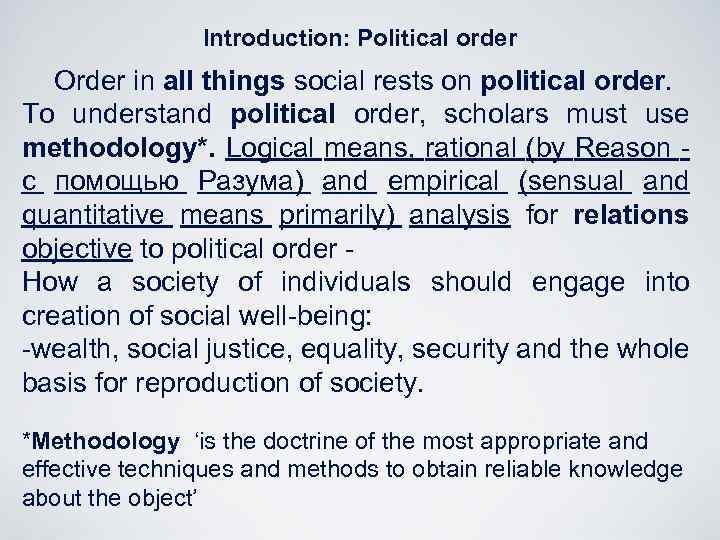 Introduction: Political order Order in all things social rests on political order. To understand political order, scholars must use methodology*. Logical means, rational (by Reason - c помощью Разума) and empirical (sensual and quantitative means primarily) analysis for relations objective to political order How a society of individuals should engage into creation of social well-being: -wealth, social justice, equality, security and the whole basis for reproduction of society. *Methodology ‘is the doctrine of the most appropriate and effective techniques and methods to obtain reliable knowledge about the object’
Introduction: Political order Order in all things social rests on political order. To understand political order, scholars must use methodology*. Logical means, rational (by Reason - c помощью Разума) and empirical (sensual and quantitative means primarily) analysis for relations objective to political order How a society of individuals should engage into creation of social well-being: -wealth, social justice, equality, security and the whole basis for reproduction of society. *Methodology ‘is the doctrine of the most appropriate and effective techniques and methods to obtain reliable knowledge about the object’
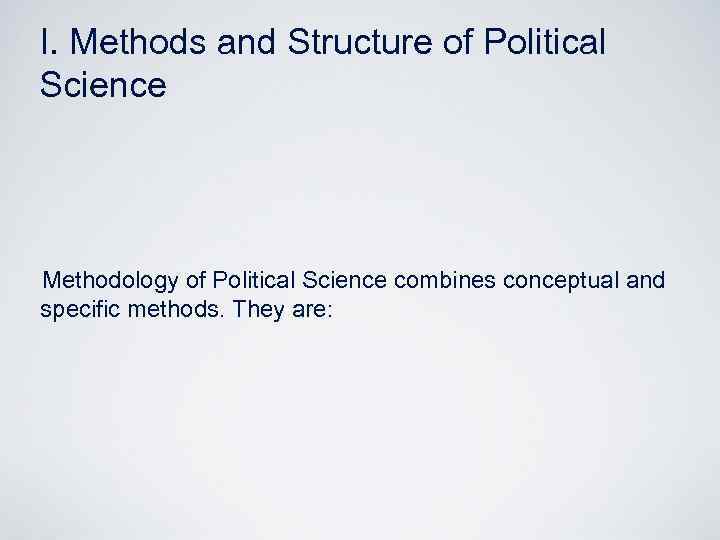 I. Methods and Structure of Political Science Methodology of Political Science combines conceptual and specific methods. They are:
I. Methods and Structure of Political Science Methodology of Political Science combines conceptual and specific methods. They are:
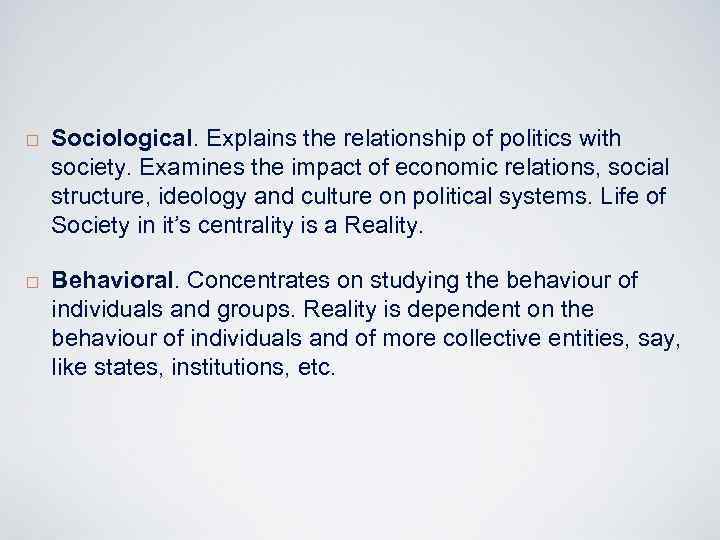 ¨ ¨ Sociological. Explains the relationship of politics with society. Examines the impact of economic relations, social structure, ideology and culture on political systems. Life of Society in it’s centrality is a Reality. Behavioral. Concentrates on studying the behaviour of individuals and groups. Reality is dependent on the behaviour of individuals and of more collective entities, say, like states, institutions, etc.
¨ ¨ Sociological. Explains the relationship of politics with society. Examines the impact of economic relations, social structure, ideology and culture on political systems. Life of Society in it’s centrality is a Reality. Behavioral. Concentrates on studying the behaviour of individuals and groups. Reality is dependent on the behaviour of individuals and of more collective entities, say, like states, institutions, etc.
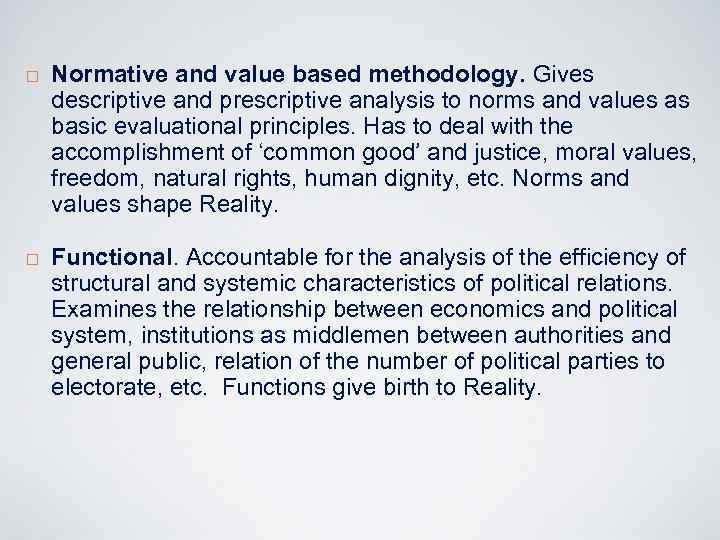 ¨ ¨ Normative and value based methodology. Gives descriptive and prescriptive analysis to norms and values as basic evaluational principles. Has to deal with the accomplishment of ‘common good’ and justice, moral values, freedom, natural rights, human dignity, etc. Norms and values shape Reality. Functional. Accountable for the analysis of the efficiency of structural and systemic characteristics of political relations. Examines the relationship between economics and political system, institutions as middlemen between authorities and general public, relation of the number of political parties to electorate, etc. Functions give birth to Reality.
¨ ¨ Normative and value based methodology. Gives descriptive and prescriptive analysis to norms and values as basic evaluational principles. Has to deal with the accomplishment of ‘common good’ and justice, moral values, freedom, natural rights, human dignity, etc. Norms and values shape Reality. Functional. Accountable for the analysis of the efficiency of structural and systemic characteristics of political relations. Examines the relationship between economics and political system, institutions as middlemen between authorities and general public, relation of the number of political parties to electorate, etc. Functions give birth to Reality.
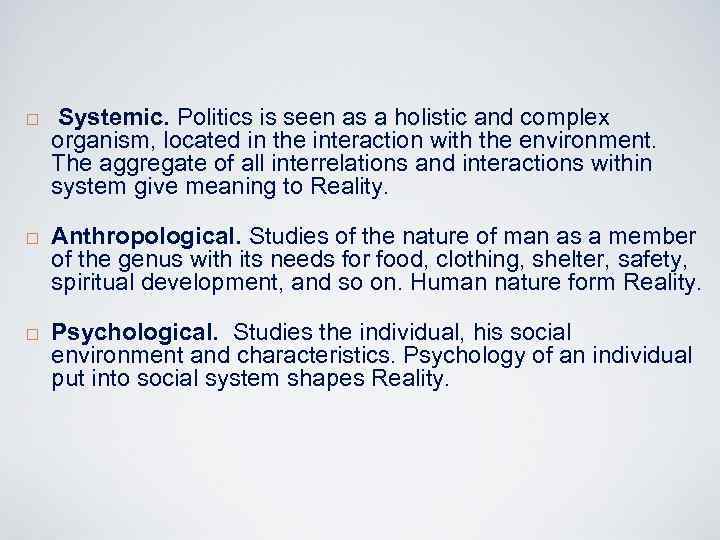 ¨ ¨ ¨ Systemic. Politics is seen as a holistic and complex organism, located in the interaction with the environment. The aggregate of all interrelations and interactions within system give meaning to Reality. Anthropological. Studies of the nature of man as a member of the genus with its needs for food, clothing, shelter, safety, spiritual development, and so on. Human nature form Reality. Psychological. Studies the individual, his social environment and characteristics. Psychology of an individual put into social system shapes Reality.
¨ ¨ ¨ Systemic. Politics is seen as a holistic and complex organism, located in the interaction with the environment. The aggregate of all interrelations and interactions within system give meaning to Reality. Anthropological. Studies of the nature of man as a member of the genus with its needs for food, clothing, shelter, safety, spiritual development, and so on. Human nature form Reality. Psychological. Studies the individual, his social environment and characteristics. Psychology of an individual put into social system shapes Reality.
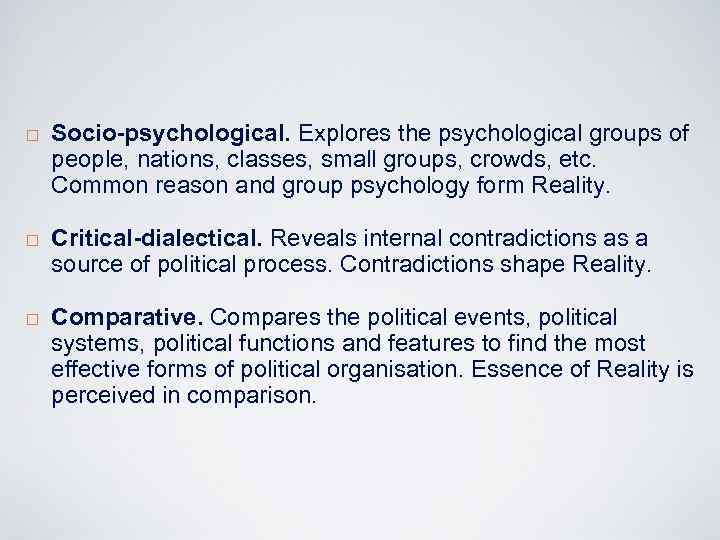 ¨ ¨ ¨ Socio-psychological. Explores the psychological groups of people, nations, classes, small groups, crowds, etc. Common reason and group psychology form Reality. Critical-dialectical. Reveals internal contradictions as a source of political process. Contradictions shape Reality. Comparative. Compares the political events, political systems, political functions and features to find the most effective forms of political organisation. Essence of Reality is perceived in comparison.
¨ ¨ ¨ Socio-psychological. Explores the psychological groups of people, nations, classes, small groups, crowds, etc. Common reason and group psychology form Reality. Critical-dialectical. Reveals internal contradictions as a source of political process. Contradictions shape Reality. Comparative. Compares the political events, political systems, political functions and features to find the most effective forms of political organisation. Essence of Reality is perceived in comparison.
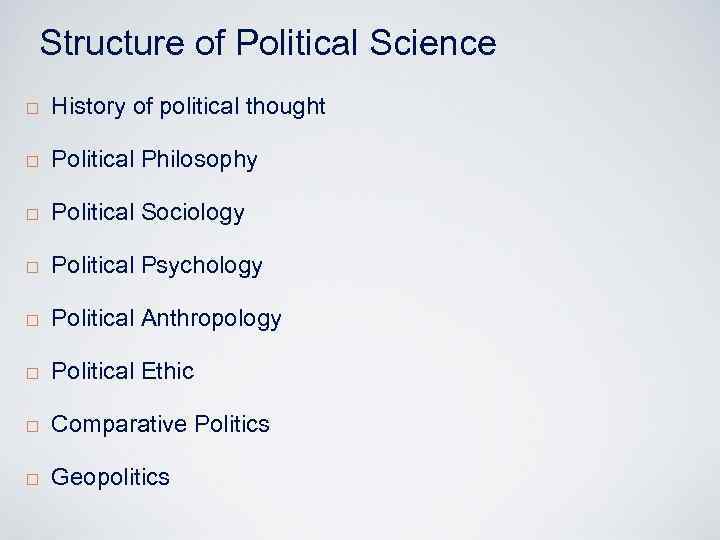 Structure of Political Science ¨ History of political thought ¨ Political Philosophy ¨ Political Sociology ¨ Political Psychology ¨ Political Anthropology ¨ Political Ethic ¨ Comparative Politics ¨ Geopolitics
Structure of Political Science ¨ History of political thought ¨ Political Philosophy ¨ Political Sociology ¨ Political Psychology ¨ Political Anthropology ¨ Political Ethic ¨ Comparative Politics ¨ Geopolitics
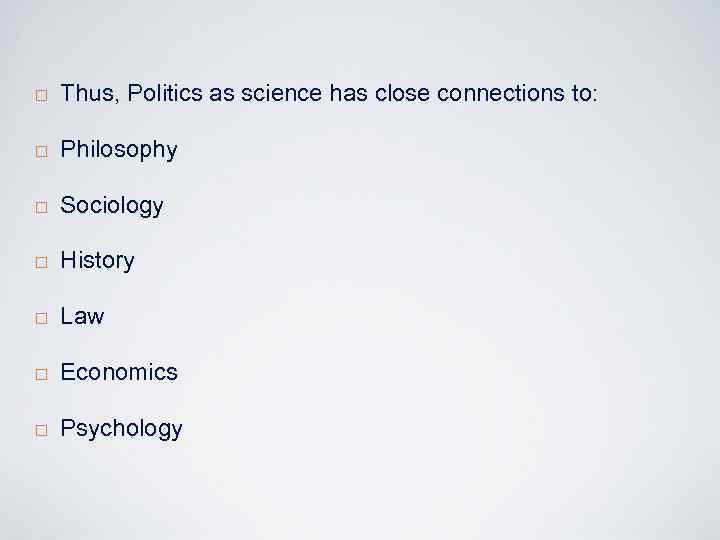 ¨ Thus, Politics as science has close connections to: ¨ Philosophy ¨ Sociology ¨ History ¨ Law ¨ Economics ¨ Psychology
¨ Thus, Politics as science has close connections to: ¨ Philosophy ¨ Sociology ¨ History ¨ Law ¨ Economics ¨ Psychology
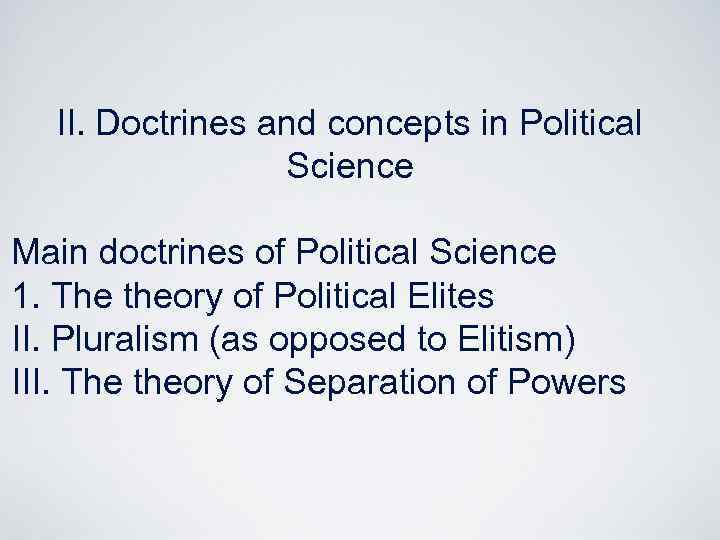 II. Doctrines and concepts in Political Science Main doctrines of Political Science 1. The theory of Political Elites II. Pluralism (as opposed to Elitism) III. The theory of Separation of Powers
II. Doctrines and concepts in Political Science Main doctrines of Political Science 1. The theory of Political Elites II. Pluralism (as opposed to Elitism) III. The theory of Separation of Powers
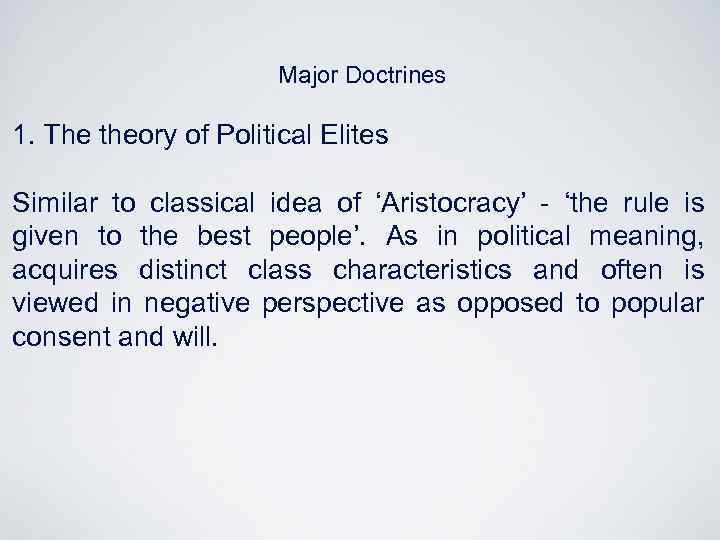 Major Doctrines 1. The theory of Political Elites Similar to classical idea of ‘Aristocracy’ - ‘the rule is given to the best people’. As in political meaning, acquires distinct class characteristics and often is viewed in negative perspective as opposed to popular consent and will.
Major Doctrines 1. The theory of Political Elites Similar to classical idea of ‘Aristocracy’ - ‘the rule is given to the best people’. As in political meaning, acquires distinct class characteristics and often is viewed in negative perspective as opposed to popular consent and will.
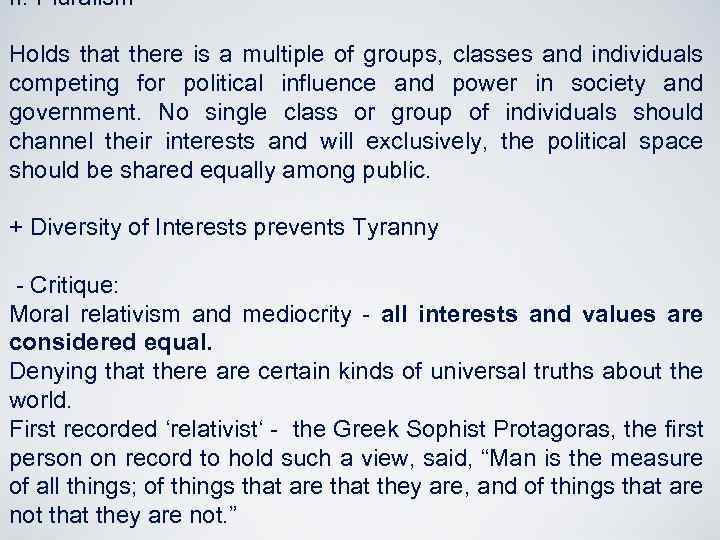 II. Pluralism Holds that there is a multiple of groups, classes and individuals competing for political influence and power in society and government. No single class or group of individuals should channel their interests and will exclusively, the political space should be shared equally among public. + Diversity of Interests prevents Tyranny - Critique: Moral relativism and mediocrity - all interests and values are considered equal. Denying that there are certain kinds of universal truths about the world. First recorded ‘relativist‘ - the Greek Sophist Protagoras, the first person on record to hold such a view, said, “Man is the measure of all things; of things that are that they are, and of things that are not that they are not. ”
II. Pluralism Holds that there is a multiple of groups, classes and individuals competing for political influence and power in society and government. No single class or group of individuals should channel their interests and will exclusively, the political space should be shared equally among public. + Diversity of Interests prevents Tyranny - Critique: Moral relativism and mediocrity - all interests and values are considered equal. Denying that there are certain kinds of universal truths about the world. First recorded ‘relativist‘ - the Greek Sophist Protagoras, the first person on record to hold such a view, said, “Man is the measure of all things; of things that are that they are, and of things that are not that they are not. ”
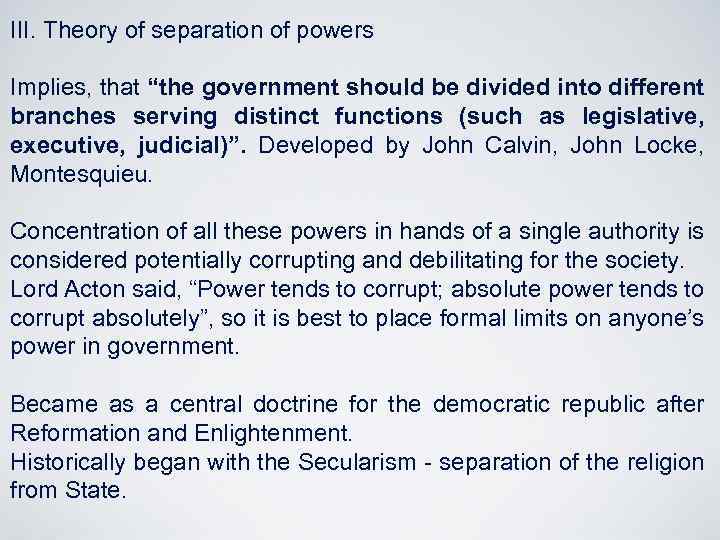 III. Theory of separation of powers Implies, that “the government should be divided into different branches serving distinct functions (such as legislative, executive, judicial)”. Developed by John Calvin, John Locke, Montesquieu. Concentration of all these powers in hands of a single authority is considered potentially corrupting and debilitating for the society. Lord Acton said, “Power tends to corrupt; absolute power tends to corrupt absolutely”, so it is best to place formal limits on anyone’s power in government. Became as a central doctrine for the democratic republic after Reformation and Enlightenment. Historically began with the Secularism - separation of the religion from State.
III. Theory of separation of powers Implies, that “the government should be divided into different branches serving distinct functions (such as legislative, executive, judicial)”. Developed by John Calvin, John Locke, Montesquieu. Concentration of all these powers in hands of a single authority is considered potentially corrupting and debilitating for the society. Lord Acton said, “Power tends to corrupt; absolute power tends to corrupt absolutely”, so it is best to place formal limits on anyone’s power in government. Became as a central doctrine for the democratic republic after Reformation and Enlightenment. Historically began with the Secularism - separation of the religion from State.
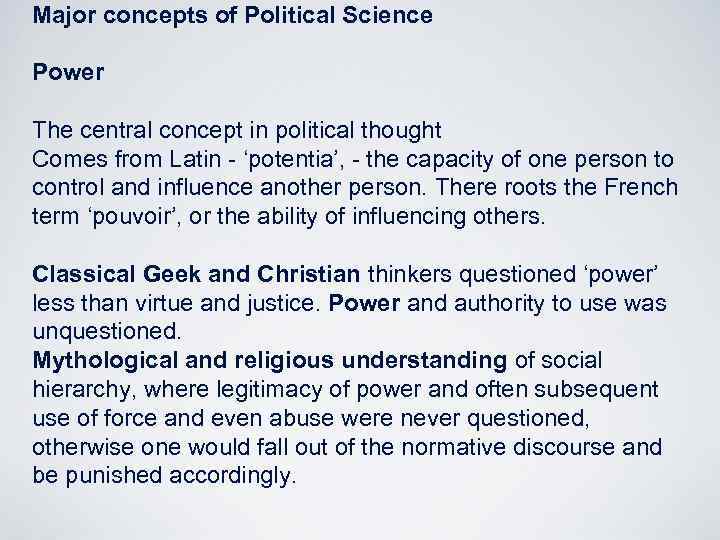 Major concepts of Political Science Power The central concept in political thought Comes from Latin - ‘potentia’, - the capacity of one person to control and influence another person. There roots the French term ‘pouvoir’, or the ability of influencing others. Classical Geek and Christian thinkers questioned ‘power’ less than virtue and justice. Power and authority to use was unquestioned. Mythological and religious understanding of social hierarchy, where legitimacy of power and often subsequent use of force and even abuse were never questioned, otherwise one would fall out of the normative discourse and be punished accordingly.
Major concepts of Political Science Power The central concept in political thought Comes from Latin - ‘potentia’, - the capacity of one person to control and influence another person. There roots the French term ‘pouvoir’, or the ability of influencing others. Classical Geek and Christian thinkers questioned ‘power’ less than virtue and justice. Power and authority to use was unquestioned. Mythological and religious understanding of social hierarchy, where legitimacy of power and often subsequent use of force and even abuse were never questioned, otherwise one would fall out of the normative discourse and be punished accordingly.
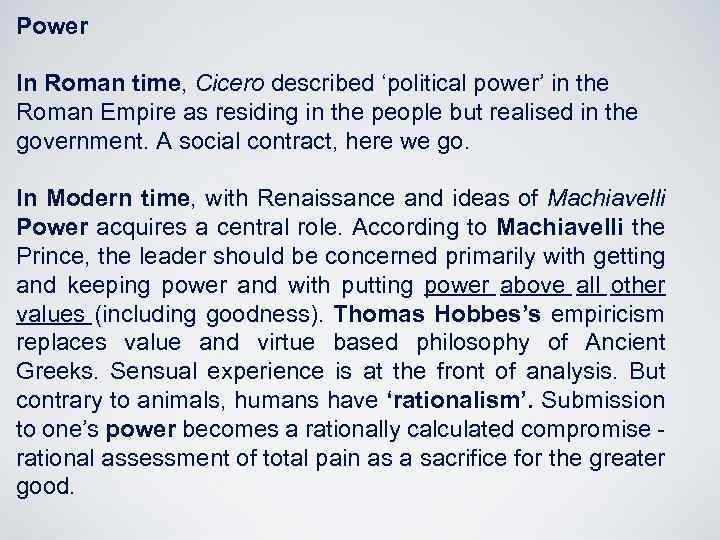 Power In Roman time, Cicero described ‘political power’ in the Roman Empire as residing in the people but realised in the government. A social contract, here we go. In Modern time, with Renaissance and ideas of Machiavelli Power acquires a central role. According to Machiavelli the Prince, the leader should be concerned primarily with getting and keeping power and with putting power above all other values (including goodness). Thomas Hobbes’s empiricism replaces value and virtue based philosophy of Ancient Greeks. Sensual experience is at the front of analysis. But contrary to animals, humans have ‘rationalism’. Submission to one’s power becomes a rationally calculated compromise - rational assessment of total pain as a sacrifice for the greater good.
Power In Roman time, Cicero described ‘political power’ in the Roman Empire as residing in the people but realised in the government. A social contract, here we go. In Modern time, with Renaissance and ideas of Machiavelli Power acquires a central role. According to Machiavelli the Prince, the leader should be concerned primarily with getting and keeping power and with putting power above all other values (including goodness). Thomas Hobbes’s empiricism replaces value and virtue based philosophy of Ancient Greeks. Sensual experience is at the front of analysis. But contrary to animals, humans have ‘rationalism’. Submission to one’s power becomes a rationally calculated compromise - rational assessment of total pain as a sacrifice for the greater good.
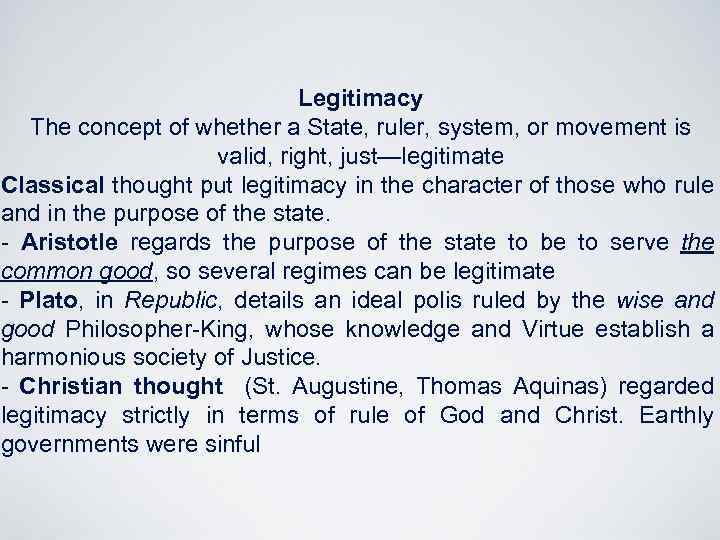 Legitimacy The concept of whether a State, ruler, system, or movement is valid, right, just—legitimate Classical thought put legitimacy in the character of those who rule and in the purpose of the state. - Aristotle regards the purpose of the state to be to serve the common good, so several regimes can be legitimate - Plato, in Republic, details an ideal polis ruled by the wise and good Philosopher-King, whose knowledge and Virtue establish a harmonious society of Justice. - Christian thought (St. Augustine, Thomas Aquinas) regarded legitimacy strictly in terms of rule of God and Christ. Earthly governments were sinful
Legitimacy The concept of whether a State, ruler, system, or movement is valid, right, just—legitimate Classical thought put legitimacy in the character of those who rule and in the purpose of the state. - Aristotle regards the purpose of the state to be to serve the common good, so several regimes can be legitimate - Plato, in Republic, details an ideal polis ruled by the wise and good Philosopher-King, whose knowledge and Virtue establish a harmonious society of Justice. - Christian thought (St. Augustine, Thomas Aquinas) regarded legitimacy strictly in terms of rule of God and Christ. Earthly governments were sinful
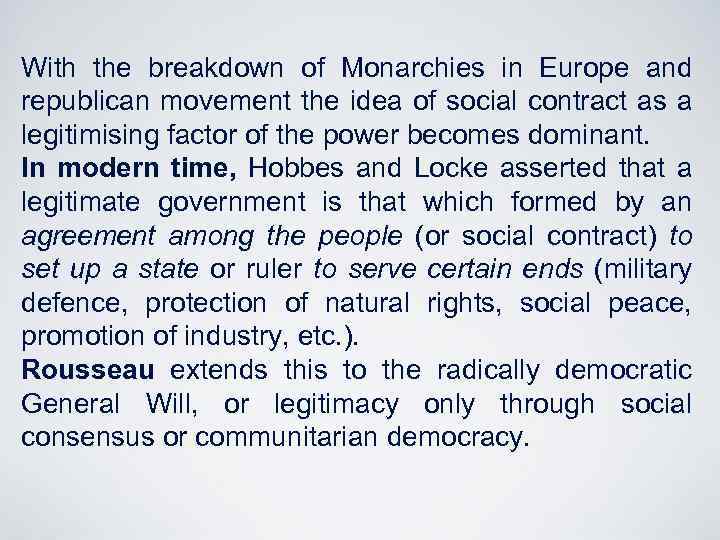 With the breakdown of Monarchies in Europe and republican movement the idea of social contract as a legitimising factor of the power becomes dominant. In modern time, Hobbes and Locke asserted that a legitimate government is that which formed by an agreement among the people (or social contract) to set up a state or ruler to serve certain ends (military defence, protection of natural rights, social peace, promotion of industry, etc. ). Rousseau extends this to the radically democratic General Will, or legitimacy only through social consensus or communitarian democracy.
With the breakdown of Monarchies in Europe and republican movement the idea of social contract as a legitimising factor of the power becomes dominant. In modern time, Hobbes and Locke asserted that a legitimate government is that which formed by an agreement among the people (or social contract) to set up a state or ruler to serve certain ends (military defence, protection of natural rights, social peace, promotion of industry, etc. ). Rousseau extends this to the radically democratic General Will, or legitimacy only through social consensus or communitarian democracy.
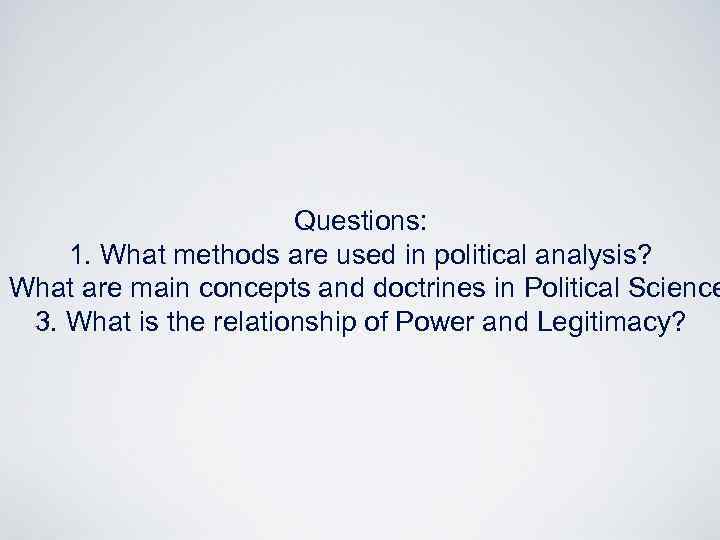 Questions: 1. What methods are used in political analysis? . What are main concepts and doctrines in Political Science 3. What is the relationship of Power and Legitimacy?
Questions: 1. What methods are used in political analysis? . What are main concepts and doctrines in Political Science 3. What is the relationship of Power and Legitimacy?
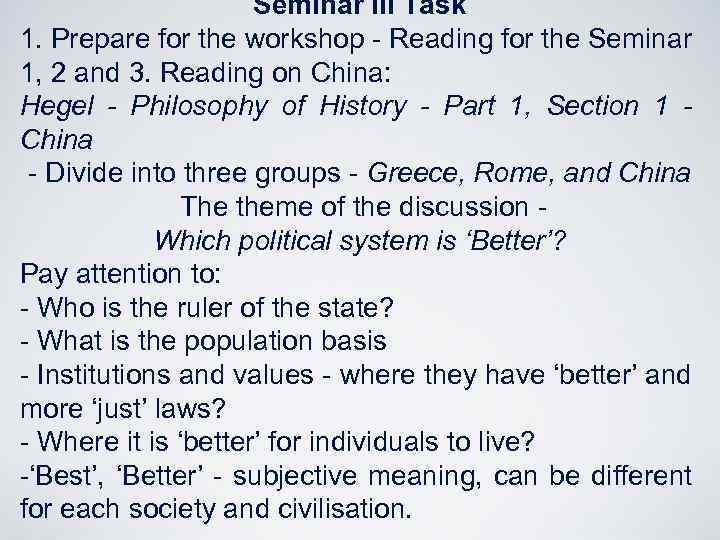 Seminar III Task 1. Prepare for the workshop - Reading for the Seminar 1, 2 and 3. Reading on China: Hegel - Philosophy of History - Part 1, Section 1 China - Divide into three groups - Greece, Rome, and China The theme of the discussion Which political system is ‘Better’? Pay attention to: - Who is the ruler of the state? - What is the population basis - Institutions and values - where they have ‘better’ and more ‘just’ laws? - Where it is ‘better’ for individuals to live? -‘Best’, ‘Better’ - subjective meaning, can be different for each society and civilisation.
Seminar III Task 1. Prepare for the workshop - Reading for the Seminar 1, 2 and 3. Reading on China: Hegel - Philosophy of History - Part 1, Section 1 China - Divide into three groups - Greece, Rome, and China The theme of the discussion Which political system is ‘Better’? Pay attention to: - Who is the ruler of the state? - What is the population basis - Institutions and values - where they have ‘better’ and more ‘just’ laws? - Where it is ‘better’ for individuals to live? -‘Best’, ‘Better’ - subjective meaning, can be different for each society and civilisation.
